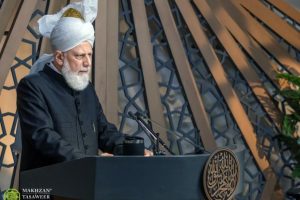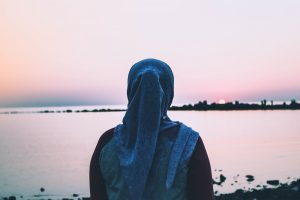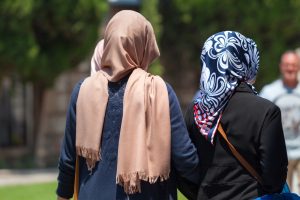
Amnah Khan MSc (Molecular and Cell Biology) is currently taking great strides in discovering something we all desire, a cure for cancer. She and her team at the University of Malta have discovered novel chemicals which accelerate the ageing of bone cancer cells. The discovery may offer a groundbreaking treatment for bone cancer (osteosarcoma), a painful disease which affects children and adolescents as well as the elderly. It may prove a welcome alternative to current treatments such as chemotherapy and radiotherapy, which are both aggressive and debilitating. Bone cancer can affect children’s development, fertility and even cause secondary cancers. Amnah Khan’s research with chemicals that leave healthy cells unaffected, is potentially revolutionary.
Amnah is of Pakistani heritage and moved to Malta with her family in her teens. Still only in her twenties, her pioneering research has been supported by the Endeavour Scholarship. It has also elicited the support of the President of Malta, George Vella, whom Amnah recently met. The Review of Religions Women’s Section Editor, Munavara Ghauri, had the privilege to learn something of Amnah’s research and future goals.
***
MG: Welcome Amnah, to The Review of Religions Magazine. Thank you for sacrificing some of your precious time for us. How did your interest in Molecular and Cell Biology develop?
Amnah: Wa alaikum assalam. Thanks for giving me the opportunity to share my knowledge with our beloved Jama’at (Community).
Molecular and Cell Biology intersects modern cellular biology research with medicine and society. It is rooted in the investigation of biological processes based on the study of molecules and their interactions in the context of cells and tissues. It gives me the opportunity to study normal physiology and disease. My interest was in cancer biology. This is because I witnessed first-hand my maternal grandmother’s unbearable suffering and my experience of helplessness, when she was faced with this very challenging condition. The cumulative effects of this experience and in particular what I witnessed, motivated me to study cancer and gain an in-depth knowledge of the subject. I was hopeful that I may be able to contribute to the essential research needed to find a cure for it and to reduce the suffering of patients.
MG: Certainly, it’s a pressing need in our current times. Here in the UK alone, cancer caused 166, 538 deaths in 2016-2018.1

Amnah: Cancer is a leading cause of death worldwide, around 17 million people are diagnosed with cancer each year 2 and unfortunately more than half of patients eventually die from it. Thus, it is of the utmost importance to contribute in this field of research so as to help people to live longer and with better quality of life.
MG: You moved to Malta in your teens. Why was this?
Amnah: I am originally from Pakistan. Malta is now my home as I have been living here for half of my life. My maternal grandmother invited my family and I to Malta. She succumbed to cancer a short time into my stay here. I gained my higher education from Malta College of Arts Science and Technology (MCAST) and I am proud to be the first student to progress to the Master Programme on bone cancer research at the University of Malta.
MG: When did you start the research on the particular novel chemicals that you think can lead to a new way of treating bone cancer?
Amnah: I started my research to find a potential treatment for bone cancer in 2019. My aim was to find an innovative treatment by looking for a novel drug that might be produced through natural products found in insects. This treatment helps cancer cells age and die naturally, ceasing to reproduce and cause harm to the body. By the Grace of Allah, I have had promising results that show bone cancer cells aging as a result of the tests that I am sharing with you.

It is really great that we tested these chemicals for the first time on bone cancer cells. This maturing of bone cells is precisely what we want and are looking for. In reality, any treatment found can be used in combination with traditional chemotherapy. However, chemotherapy can then be given at a lower dose. This in turn will reduce a patient’s suffering.

MG: A truly groundbreaking discovery Amnah. Do you have any idea why the novel chemicals age cancer cells but not healthy bone cells?
Amnah: Normal cells grow old and die naturally while cancer cells remain in an immature stage. As a result, patients suffering from cancer grow weaker and the cancer cells inside their bodies grow stronger.
The function of these natural chemicals is to age and mature the immature cells that have lost the ability to become mature cells i.e. cancer cells. The best part about these natural chemicals is that they treat cancer without harming healthy cells.
Tests that we have conducted using these natural chemicals in our lab show no signs of harm on healthy bone cells and this is ground-breaking. The paradox of only affecting cancer cells by maturing them whilst not harming healthy bone cells is quite amazing and very welcome.

MG: That is amazing! The potential of such chemicals is truly breathtaking. Currently, what treatments are available for bone cancer?
Amnah: Bone cancer is very hard to treat. Excluding surgery that is invasive, it has no other treatment apart from intensive Chemotherapy and Radiotherapy, which adds pain to an already excruciatingly painful type of cancer. These therapies are quite harmful to the body as it treats cancer but also harms the healthy cells.
These therapies cause hair loss and make patients more prone to infections and nausea. Moreover, they have many serious side effects. It affects children adversely in their development and can affect their quality of life. They cause secondary cancers and fertility issues in the latter stages of life. Therefore, new therapies are needed and essential for the treatment of bone cancer in order to decrease the use of chemotherapy, especially in the more vulnerable age of adolescence.
MG: Is bone cancer a preventable type of cancer and as individuals can we do anything to reduce the risk of developing it?
Amnah: There isn’t a diagnostic test for early detection of bone cancer. Bone cancer causes growing pains that don’t resolve even with rest, as well as swelling, tenderness and fractures after a minor fall. If anyone experiences persistent pain in the bone, they should visit a doctor. Especially, if the pain doesn’t resolve after taking pain killers. A doctor may suggest an X-ray, MRI, CT or bone scans. The most definitive way of diagnosing bone cancer is to perform a biopsy i.e. take a sample of affected bone and send it to a laboratory for testing. This can determine exactly what type of bone cancer one has and what grade it is. There is no definitive prevention as such. A healthy diet and regular exercise is recommended to prevent all cancers.
MG: Realistically speaking, how long do you think it will take for this revolutionary treatment of bone cancer to become a standard treatment in hospitals?
Amnah Research into this pioneering treatment is at the relatively early stages. However, the results are very encouraging. Future research will entail testing these drugs on other bone cancer cells to ensure and eliminate the effect of chance. Further studies in pre-clinical models of bone cancer in fish or mice will define the effectiveness of this treatment on bone cancer in living organisms and prove an absence of harmful side effects.
MG: You recently met the President of Malta (George Vella) to present your research. How was the momentous meeting?
Amnah: I was honoured to meet the President of Malta. I presented my research book to him and briefed him in detail on my research. His Excellency is a medical doctor. He shared his story with me that whilst he was working, he witnessed many people’s deaths due to blood cancer. However, thanks to research on cancer this is now curable.
He appreciated my work, encouraged me tremendously and asked me to consider some aspects related to my research.

It was a great meeting. I introduced our Ahmadiyya Muslim Community to him and discussed the difficulties we are facing in Pakistan. His Excellency asked whether there were any restrictions on practicing our faith in Malta. I told him that we have freedom of religion here and we are very happy that we can practice our faith without any restrictions. In my research book, I wrote the Qur’anic verse ‘Allah Created the heavens and the earth in accordance with the requirements of wisdom. In that, surely, is a Sign for the believers.’ (Ch29:V45) and told him how important it was for me as an Ahmadi Muslim to carry out this research. The meeting was very memorable. It’s an honour for me to represent Pakistan in a European country like Malta.

MG: You procured the Endeavour Scholarship to help fund your research. Can you tell us what this is?
Amnah: The fund is part-financed by the European Union’s Operational Program. The scheme supports quality tertiary education to ensure that the Maltese labour market has the best human resources to place it in a better position to compete in the international market.
Finance is key to planning research work. Despite a number of other students applying for this scholarship which is highly competitive, Alhamdulillah, I was awarded it owing to the quality of my application. The time spent on preparing for this as well as the interview, made the stressful process worthwhile.
MG: Moving forward, what would you like to research in the future?
Amnah: My foremost goal and aim is to continue this research so I can witness its benefits to humanity and society at large. I would like to cite a saying of our beloved Prophet Muhammad (Peace Be Upon Him): ‘Allah did not send down any disease but that He also sent down the cure.’ (Sahih Hadith Bukhari & Muslim). Allah will guide those people who work relentlessly to find it. A researcher’s prime goal is to investigate, be technically curious and strive to find the cure.
MG: So, it seems that your faith has profoundly influenced your career?
Amnah: Yes, in the Holy Qur’an Allah says:
‘And these are similitudes which We set forth for mankind, but only those understand them who have knowledge.’ Holy Qur’an (Ch29:V44)
‘Proclaim thou in the name of thy Lord Who created, Created man from a clot of blood. Proclaim! And thy Lord is Most Generous, Who taught by the pen, Taught man what he knew not.’ Holy Qur’an (Ch96:Vs2-6)

‘In the creation of the heavens and the earth and in the alteration of the night and day there are indeed signs for men of understanding.’ Holy Qur’an (Ch3:V191)
These verses clearly demonstrate that every law of creation is in fact the law of Allah and we can discover these as He has given us the ability to do so. These verses inspired me to start my career in scientific research for the service of mankind.
MG: Malta is a predominantly Catholic country. Have you ever felt any opposition or tension as a practicing Muslim woman living there?
Amnah No, Alhamdulillah, Malta encourages all people to progress in their fields. I often have conversations regarding Islam with my colleagues. I always try to make them understand by showing them the true picture of Islam Ahmadiyyat and giving references by taking Islam and science into consideration. Alhamdulillah, I have managed to resolve their queries and corrected their misconceptions about Islam. Now, when they have any questions about Islam, they approach me and ask if the information is correct or was manipulated. I have successfully managed to make them understand Islam.
MG: Has your hijab (veil) hindered your work in any way?
Amnah: No, Alhamdulillah, people are understanding and respectful here.
MG: How would you respond to those who say that Islam oppresses women and considers them inferior to men?
Amnah: I explain that Islam Ahmadiyyat is the true message of Islam and as such, I am personally an example of someone who has equal opportunities. Hence, (as a Muslim) I am encouraged to practice my profession.
MG: On a lighter note, I have read Malta boasts some exotic cuisine including rabbit and octopus stews and savoury pastries (pastizzi). If I were to visit, what would you recommend that I try?
Amnah: I would recommend Maltese pastizzi, if you like cheese and curried peas and the delights of delicious pastries!

MG: Sounds good! Finally, what advice would you give to young women who may wish to pursue a career in Molecular Biology?
Amnah: There are numerous things that require research and would help us to contribute to humanity. We have the Holy Qur’an which provides an answer to everything from a microscopic atom to the largest creation (our universe). Those of us who are Muslims should research, pray and take our guidance from the Holy Qur’an.

Research requires time and effort. I remember a time when I had to stay all day at the lab and came home at 2am in the morning. Sometimes, I do not have enough time to eat or drink whilst working. It is however a wonderful experience that teaches you how to cope alone in difficult situations and make mistakes, figure out what you did wrong, learn from them and try not to repeat them the next time. Also, one should get to know fellow work colleagues and appreciate the efforts researchers are doing for the betterment of society.
Research requires hard work and dedication. It is of the utmost importance to be passionate in research, so that you become absorbed in your work. You have to be curious. Finding answers may not be easy. You also need to be focused, patient and not one to lose hope as is mentioned in the Holy Qur’an ‘This Qur’an is a clear demonstration to men, and a guidance and an admonition to the God-Fearing.’ (Ch3:V139) Failure actually leads to the fruits of our hard work. So, my advice would be to be patient, resilient and determined. With prayer, you will Insha’Allah succeed.
MG: Thank you Amnah for this fascinating insight into your groundbreaking research. It’s been a privilege and I feel that you have shared a special moment in medical history with us. We wish you the best of luck in your future research and are very grateful for all that you are doing for the service of mankind.

***
[1] https://www.cancerresearchuk.org/health-professional/cancer-statistics-for-the-uk#heading-Zero




Add Comment